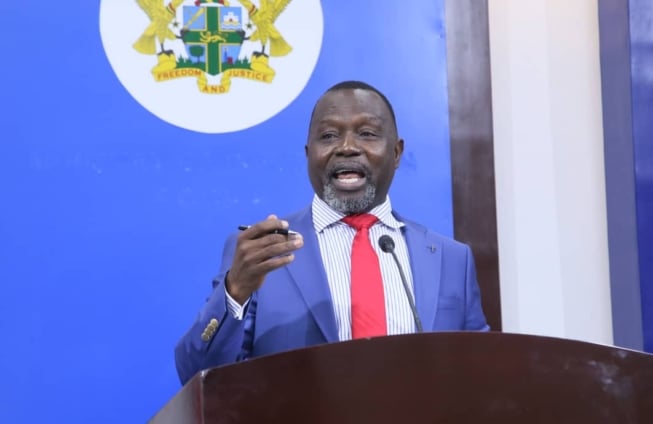On Monday, July 28, 2025, Attorney-General and Minister for Justice, Dr. Dominic Ayine, addressed the nation in a significant installment of the Government Accountability Series. This public engagement aimed to shed light on two prominent legal matters: the controversial uniBank case and the progress of Operation Recover All Loots (ORAL), the government’s initiative to reclaim misappropriated public funds. Dr. Ayine’s address, commencing at 11:00 a.m., sought to provide clarity and transparency, addressing the rising public scrutiny surrounding these pivotal issues within the Ghanaian legal landscape. The event was positioned as a key element of the Mahama administration’s broader agenda to regain public trust and reinforce good governance principles.
The uniBank case, a subject of intense public interest and media speculation, formed a central component of Dr. Ayine’s presentation. He articulated the legal rationale behind the government’s recent decisions regarding the bank, addressing the complexities of the case and aiming to dispel misinformation circulating in the public domain. This detailed explanation served as a direct response to the growing demand for transparency and accountability in the handling of this sensitive financial matter. By presenting the government’s perspective, Dr. Ayine sought to inform public discourse and foster a more nuanced understanding of the legal and financial intricacies at play.
Complementing the uniBank discussion, Dr. Ayine provided a comprehensive update on the ongoing Operation Recover All Loots (ORAL) initiative. This program, designed to recover assets acquired through illicit means, targets individuals and entities accused of plundering public resources. The Attorney-General’s report outlined the current progress achieved under ORAL, highlighting successes and addressing challenges encountered. He also discussed emerging concerns, offering the government’s perspective on these issues and clarifying its position on necessary legal and institutional reforms. This segment underscored the government’s commitment to transparency and accountability in its pursuit of justice and financial rectitude.
Dr. Ayine’s presentation served as a pivotal platform to communicate the government’s progress in the ongoing pursuit of justice and accountability. By addressing the uniBank case and the ORAL initiative, he sought to inform the public, quell anxieties, and demonstrate the administration’s commitment to transparency. This public engagement was framed as a critical step in the broader “reset agenda” of the Mahama administration, aiming to rebuild public trust in state institutions and reinforce the principles of good governance. The event signified the government’s recognition of the public’s right to information and its role in fostering a culture of accountability within the nation.
The Attorney-General emphasized the importance of transparency and due process in both the uniBank case and the broader ORAL initiative. He reiterated the government’s commitment to upholding the rule of law and ensuring that all actions taken are within the bounds of legal and ethical frameworks. By outlining the legal basis for decisions and actions, Dr. Ayine aimed to demonstrate the government’s adherence to established legal procedures and its commitment to a fair and just process for all parties involved. This emphasis on legal propriety served to reinforce the government’s commitment to building a robust and transparent legal system.
Dr. Ayine’s address was anticipated to stimulate further public discussion on vital issues such as accountability, justice delivery, and the rule of law. By providing a platform for open dialogue and information dissemination, the Government Accountability Series aimed to strengthen public engagement in these critical areas of national governance. The event underscored the Mahama administration’s commitment to fostering a more informed and participatory citizenry, enabling citizens to actively contribute to the strengthening of democratic institutions and the promotion of good governance principles. This proactive approach to public engagement aimed to build a stronger, more transparent, and accountable government.


